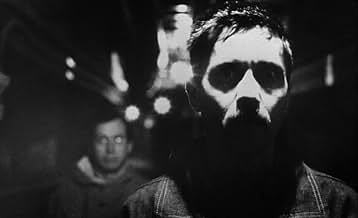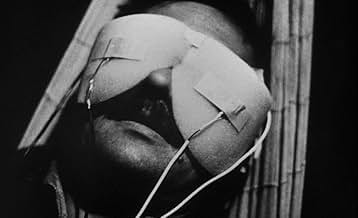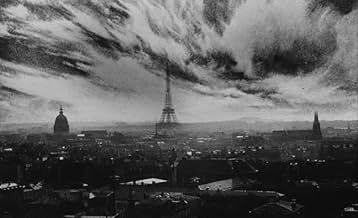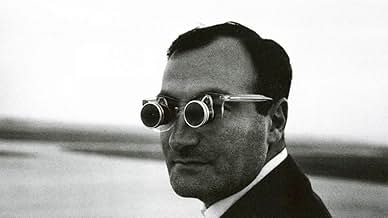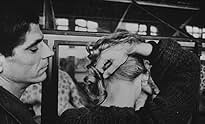La jetée
- 1962
- Tous publics
- 28min
NOTE IMDb
8,2/10
39 k
MA NOTE
L'histoire d'un homme forcé à explorer ses souvenirs au lendemain de la dévastation de la Troisième Guerre mondiale, sous forme d'une suite de photos.L'histoire d'un homme forcé à explorer ses souvenirs au lendemain de la dévastation de la Troisième Guerre mondiale, sous forme d'une suite de photos.L'histoire d'un homme forcé à explorer ses souvenirs au lendemain de la dévastation de la Troisième Guerre mondiale, sous forme d'une suite de photos.
- Réalisation
- Scénario
- Casting principal
- Récompenses
- 2 victoires au total
Jean Négroni
- Narrator
- (voix)
- (as Jean Negroni)
Ligia Branice
- A woman from the future
- (as Ligia Borowcyk)
William Klein
- A man from the future
- (as Bill Klein)
James Kirk
- Narrator
- (English version)
- (voix)
Avis à la une
10tsmiljan
If you can find this rare film, you must see it. Unique in film history, this experimental short film consists of a series of still shots tied together by narration. It is the story of a post-apocalyptic Earth and time travel. Each still shot is a work of art, and the plot is compelling. A man with a strong memory of a past event witnessed as a small child (a person being shot at an airport), is periodically sent back into that pre-war period by "experimenters" with devious purposes. While visiting the past, the hero falls in love with a woman from that past.
Watch for the one and only scene that contains any movement and natural sounds (birds in the background, while the woman wakes up next to her lover). Coming in the midst of the relentless still shots, it is one of the most sublime moments in all cinema. You are doing yourself a disservice if you do not see this film.
Watch for the one and only scene that contains any movement and natural sounds (birds in the background, while the woman wakes up next to her lover). Coming in the midst of the relentless still shots, it is one of the most sublime moments in all cinema. You are doing yourself a disservice if you do not see this film.
"La jetée" is a million years ahead of its time. To make a movie in 1962 about World War III, time traveling and a distant future that is still genuinely disturbing and not in the least outdated comes close to a miracle.
Here's a short synopsis of the story: After World War III Paris is lying in tatters. The earth has been contaminated and survivors of the war have to live underground imprisoned by the victorious nation (it's never said explicitly which nation that is, but they are talking German). Scientists are looking for a way to secure the survival of mankind by exploring the possibilities of time traveling. In the process one of the prisoners, who has a strong connection to the past because of a recurring dream of his childhood, serves as their guinea pig. As the experiments go on the time traveler falls in love with a woman from the past and comes face to face with the childhood memory he's been obsessed with all his life.
The story might have a familiar ring to you. It's basically the same story Terry Gilliam used in "12 Monkeys". But while "12 Monkeys" is a great movie, ultimately it will be "La jetée" that will stand the test of time (no pun intended). Director/screenwriter Chris Marker's approach is amazingly clever and effective. His movie is a sequence of beautiful black and white photographs with somebody narrating the story. The pictures and the perfect music make the whole thing seem like a documentary on World War II and give the movie a disturbingly realistic feel. Marker never makes the mistake to show too much. The destruction of Paris, the experiments and the future are all hinted at rather vaguely in the pictures and in the narration. A lot is left to our imagination and when The Man, as the main character is simply called, drifts through time it almost seems like a feverish dream to the viewer, too. What's more concrete is the relationship of The Man and The Woman and the contrast between the short untroubled moments The Man spends in the past and his enslavement in the present. Marker concentrates on those aspects and almost shrugs the time traveling off as a negligibility and the result is nothing short of amazing.
With its 26 minutes running time "La jetée" accomplishes more than some epic trilogies do. It remains a classy work of art that looks fresher than any other movie from the 60's that I've ever seen and in 50 years from now it will not have lost any of its appeal, either.
Here's a short synopsis of the story: After World War III Paris is lying in tatters. The earth has been contaminated and survivors of the war have to live underground imprisoned by the victorious nation (it's never said explicitly which nation that is, but they are talking German). Scientists are looking for a way to secure the survival of mankind by exploring the possibilities of time traveling. In the process one of the prisoners, who has a strong connection to the past because of a recurring dream of his childhood, serves as their guinea pig. As the experiments go on the time traveler falls in love with a woman from the past and comes face to face with the childhood memory he's been obsessed with all his life.
The story might have a familiar ring to you. It's basically the same story Terry Gilliam used in "12 Monkeys". But while "12 Monkeys" is a great movie, ultimately it will be "La jetée" that will stand the test of time (no pun intended). Director/screenwriter Chris Marker's approach is amazingly clever and effective. His movie is a sequence of beautiful black and white photographs with somebody narrating the story. The pictures and the perfect music make the whole thing seem like a documentary on World War II and give the movie a disturbingly realistic feel. Marker never makes the mistake to show too much. The destruction of Paris, the experiments and the future are all hinted at rather vaguely in the pictures and in the narration. A lot is left to our imagination and when The Man, as the main character is simply called, drifts through time it almost seems like a feverish dream to the viewer, too. What's more concrete is the relationship of The Man and The Woman and the contrast between the short untroubled moments The Man spends in the past and his enslavement in the present. Marker concentrates on those aspects and almost shrugs the time traveling off as a negligibility and the result is nothing short of amazing.
With its 26 minutes running time "La jetée" accomplishes more than some epic trilogies do. It remains a classy work of art that looks fresher than any other movie from the 60's that I've ever seen and in 50 years from now it will not have lost any of its appeal, either.
This is one of the most stunning short films ever made. Marker has pieced together an oblique, sci-fi setting for marvelous still photography; when there is movement, it is a cause for joy! Everyone who is a cineast should see this film: it's that good and it's that important!
10myphx
The first time I saw this movie it was on a local educational TV channel (PBS was barely starting) in 1969. I was a youngster and it made such an indelible impression that I remembered it all these years. Luckily, to my surprise I discovered a copy recently at a video rental store.
The movie is only approximately 30 minutes in length and is composed of black and white still photography (except for one scene, where they show a mans eye blinking). It is a powerful depiction of the end of the world, human love and memory. The French narration adds to the poetic subtlety and drama. To my dismay, I heard there was a new DVD version available, but with English narration. Hopefully, the original French version will be made available, as it seems to add so much more to the dramatic effect of the movie.
To the average movie viewer, this film would be best described as avant-garde in nature. It is a prime example of how science fiction and drama can be produced with nuance and subtleties, rather than overuse of technological effects and gratuitous titillation and violence.
The movie is only approximately 30 minutes in length and is composed of black and white still photography (except for one scene, where they show a mans eye blinking). It is a powerful depiction of the end of the world, human love and memory. The French narration adds to the poetic subtlety and drama. To my dismay, I heard there was a new DVD version available, but with English narration. Hopefully, the original French version will be made available, as it seems to add so much more to the dramatic effect of the movie.
To the average movie viewer, this film would be best described as avant-garde in nature. It is a prime example of how science fiction and drama can be produced with nuance and subtleties, rather than overuse of technological effects and gratuitous titillation and violence.
I note that most of the comments I've seen have been written by people who saw 12 Monkeys first and then chose somehow to see La Jetee.
Comparisons are useless beyond the basic feel of the story.
When I first saw 12 Monkeys I didn't know its relationship to La Jetee, a film I had not seen in 25 years. Yet, I recognized this relationship almost immediately, even though I could not remember the name of the movie. This I realized through the feel of the story ... down to the very end.
In many ways the short film was much more stimulating ... even though I had forgotten the name of the film I had never forgotten the images or the impressions it made upon me. I guess that's strange, but as I recall I saw it at Rice University as a part of a film festival back in the 60s.
Granted, films must sustain themselves somewhat through the years to maintain their value as true art, but one must always remember the context of the film's original audience.
I wonder now if the dependence on stills to portray the story had any influence on Ken Burns? Heh ... he's made a reputation on the same technique.
My point ... accept both movies on their own merits.
Comparisons are useless beyond the basic feel of the story.
When I first saw 12 Monkeys I didn't know its relationship to La Jetee, a film I had not seen in 25 years. Yet, I recognized this relationship almost immediately, even though I could not remember the name of the movie. This I realized through the feel of the story ... down to the very end.
In many ways the short film was much more stimulating ... even though I had forgotten the name of the film I had never forgotten the images or the impressions it made upon me. I guess that's strange, but as I recall I saw it at Rice University as a part of a film festival back in the 60s.
Granted, films must sustain themselves somewhat through the years to maintain their value as true art, but one must always remember the context of the film's original audience.
I wonder now if the dependence on stills to portray the story had any influence on Ken Burns? Heh ... he's made a reputation on the same technique.
My point ... accept both movies on their own merits.
Le saviez-vous
- AnecdotesThis short film was the inspiration for the Terry Gilliam film L'Armée des 12 singes (1995).
- Crédits fousThe opening credits do not describe it as a film, but as "un photo-roman".
- ConnexionsEdited into The Hamster Factor and Other Tales of Twelve Monkeys (1996)
Meilleurs choix
Connectez-vous pour évaluer et suivre la liste de favoris afin de recevoir des recommandations personnalisées
Détails
- Durée28 minutes
- Couleur
- Mixage
- Rapport de forme
- 1.66 : 1
Contribuer à cette page
Suggérer une modification ou ajouter du contenu manquant


